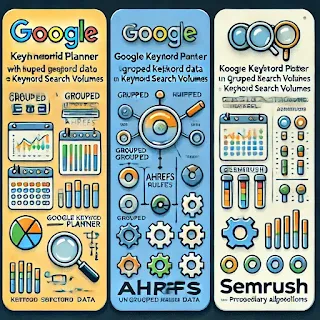When researching keywords, you've likely noticed a discrepancy in search volumes across tools like Google Keyword Planner, Keywords Everywhere, Ahrefs, and Semrush. For instance, if we examine the search term "Jigsaw Puzzle," we see:
- Google Keyword Planner: 40,500 searches per month 🙄
- Ahrefs Keyword Tool: 21,000 searches per month 🤔
These differences aren't random; they reflect different methodologies in gathering and interpreting keyword data. Here’s why each tool shows distinct results and when to use each for your SEO goals:
1. Google Keyword Planner and Keywords Everywhere: Grouped Data with "Buckets"
Google Keyword Planner (GKP) uses a technique called keyword "bucketing." This method groups similar search terms, like "jigsaw puzzle" and "jigsaw puzzles," into one bucket, delivering a combined search volume. Therefore, GKP’s 40,500 monthly searches include multiple variations of the term, providing a more generalized view of search interest across related keywords.
This grouped approach makes tools like GKP and Keywords Everywhere helpful when you’re aiming to capture broader traffic across related keywords, as it reveals the collective volume for similar terms.
2. Ahrefs: Refined Data with Ungrouping
While Ahrefs uses GKP data as a baseline, it takes an extra step by "ungrouping" keyword clusters. This means Ahrefs differentiates between variations of a term, such as singular and plural forms, to calculate more specific search volumes. Additionally, Ahrefs refines GKP data using extra data sources and proprietary click-through rate (CTR) distribution models to improve accuracy.
For targeted SEO strategies where distinguishing between specific keyword variations is crucial, Ahrefs’ ungrouped data can offer more precise insights.
3. SEMrush: Unique Algorithms and Proprietary Data
SEMrush has its own algorithms and data sources, resulting in yet another set of search volume figures. Generally, SEMrush’s volumes tend to be closer to Ahrefs than to GKP, providing a middle ground. SEMrush’s data may appeal to users who value an additional layer of proprietary analysis.
Which Tool Should You Use?
Each tool's data serves a specific purpose. The choice ultimately depends on your SEO objectives:
For Broad Traffic Estimation: If you’re looking to gauge a keyword category or broad topics, GKP’s bucketed data is useful. It provides a high-level view of the overall interest across a group of related search terms.
For Specific Keyword Research: If you want to understand whether people are searching for “motorbike” versus “motorcycle” in a certain location, ungrouped data from Ahrefs or SEMrush will offer a clearer picture. These tools help pinpoint individual term popularity and allow for more refined targeting.
Final Thoughts: Know Your Data Sources
Understanding the differences between these keyword tools is half the battle. Knowing when to use each tool—and for what purpose—will help you make smarter decisions in your keyword research, empowering you to create an effective, targeted SEO strategy.
So, next time you see conflicting search volumes, you’ll know exactly why and which data set to rely on. Happy optimizing!





No comments:
Post a Comment